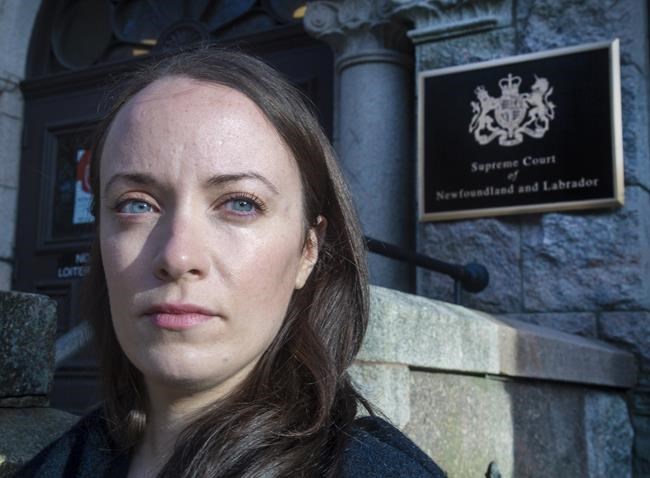ST. JOHN'S, N.L. — A new report from a women’s group in St. John’s says despite years of reforms, the Canadian justice system is failing sexual assault victims. It calls on advocates to put more resources into finding alternative routes to justice for survivors.
“We need to stop putting a piece of Scotch Tape over a pothole. It’s not in anyone’s best interests," said Bridget Clarke, advocacy coordinator with the St. John's Status of Women Council and the author of the report.
The report, titled "Survivors of Sexual Violence and the Criminal Justice System," takes a sweeping look at studies and statistics charting victims’ experiences with Canadian courts. It also looks at available reporting on the success of advocate-led reform efforts, like mandated sensitivity training for judges, lawyers and police officers.
Clarke’s conclusion is that despite years of these reforms aimed at supporting and encouraging survivors in the legal system, few victims report their assaults, fewer still see their cases end in convictions and the “vast majority” who do report find their experiences in the system “harmful and unjust.”
Meanwhile, those who are most likely to be sexually assaulted — low-income women, members of the LGTBQ community, and Black, Indigenous and women of colour, for example — are the most likely to face roadblocks in the legal system, such as discrimination and financial barriers, the report says.
“I think it’s incredibly risky . . . to put all of our resources and our efforts and our advocacy work behind reform work, including mandated training, because there’s just too many examples of how these initiatives just don’t produce the kind of widespread change that’s so desperately needed,” Clarke said in a recent interview.
Pointing to evidence showing increasing interest in restorative justice and other paths toward justice, she said: “That’s where I think the work really is to be done . . . . There needs to be an investment into a really deep dive into this work to see what’s really working and what’s not.”
The report was inspired by the case of Royal Newfoundland Constabulary officer Carl Douglas Snelgrove. Snelgrove is accused of sexually assaulting a woman in her home while he was on duty. The verdict from his first trial for the charge was successfully appealed. His second trial, in September, ended in a mistrial.
A new trial is set to begin in March, which means the alleged victim could have to testify a third time, Clarke said. “It’s another example of (what) could happen if you choose to step into this arduous process,” she said.
Ashley MacDonald is one of those Canadian women who found justice outside of the legal system. She was assaulted on Sept. 7, 2012. She reported her assault to the police, but it was months after it happened.
“I did not press any charges. My report was very much placed as, ‘This is here, and if someone else comes forward, you call me,’ ” she said in a recent interview.
Now a social worker, MacDonald said she’s found her own way to justice through routes like therapy and work advocating for and supporting victims. This summer, she made a short documentary in which she spoke to other people who had personally significant experiences on Sept. 7, 2012.
“I took away the story of when I got raped and instead created a story of the day I share with other people,” MacDonald said. “Gaining control over my story ... and deciding to tell stories that were not the story of him and what he did to me — that was the power for me.”
MacDonald said she’s always cautious of making victims feel like they have to report. The financial and emotional tolls are staggering, she said. “To know that at the end of the day, either the police are going to say, ‘This report can’t stick,’ . . . or the person’s going to be found not guilty or there’s going to be a mistrial, it’s just like, is this worth it?” she said.
Like Clarke, MacDonald recognizes some victims will want and need the justice system, but she supports Clarke’s call for advocates to also look beyond the system to help people, like her, who’ve found a different path.
“The only way for me to find any sense of justice for myself is for me to find ways for what happened to mean something,” MacDonald said.
This report by The Canadian Press was first published Nov. 13, 2020.
Sarah Smellie, The Canadian Press




